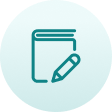Learning a Language - How it's Done
 By Eimear Dinneen - 4 minute read
By Eimear Dinneen - 4 minute readThere's no denying it, languages are hard. However, there are so many ways of improving a language, so many resources and so much help out that that you just can't get with other subjects, so take advantage of these. In this blog, we've put together some tips on how to get your languages up to scratch.

Use interactive resources
Spend some time online and do a little research, I can't stress how many resources there are out there for you. We even have some on Studyclix on each subject page within its resource box that you can have a look at!
Find a partner
If you're not into face-to-face contact you can try Lang-8 or Tandem which are sites/apps where there are native speakers ready to exchange messages to you in their language and correct any mistakes you might make.

Listen
Watch
Alternatively, you could try videos. There are loads of native speakers on YouTube who do little videos of the most important things when learning their language and things like that. Again, just do a little research and you can find some great stuff out there.

Make a vocab book
This is always a good idea. Everyday in class and at home when you do homework, you'll be looking up and learning new words. Unfortunately however, the way your brains works is, if you don't use that word again within a week, it'll disappear. Therefore, you need to write the word down, and look over what you've written down a couple of times after that. That way it'll stick. Keeping a separate book for all your new vocab is just good sense and it helps you stay organised and tidy, making your life stress-free (or less stressed at least)
Exaggerate
This is with regards to speaking. You'll probably think, Oh I sound so stupid if I roll my Rs, but trust me, it'll pay off. If you're doing French, really pronunciate that throaty R sound, if you're doing German really exaggerate that "ch" sound. The more you exaggerate, the more you sound natural. Someone with a thick Durban accent saying a French sentence, for example, will sound a lot stranger than someone exaggerating a French accent while saying a French sentence. There's really no need to be embarrassed about it, who cares at the end of the day?

Start early
Unfortunately, you can't become fluent in a day. You need to start studying and following these tips ASAP if you want a high grade. Loads of students think they can start cramming everything about a language in just weeks before an exam and it can't work; there's too much to learn. Your future self will thank you if you start as early as possible! You could even start by changing your language on Facebook, your phone, or other websites/apps to whatever language you're studying. It's not difficult to figure out and you'll be learning without even thinking about it, it's ideal.
Never stop practising
Learning a language is a continuous process, it doesn't just stop when you think you know it all. If you stop studying and stop practicing your language, your skills will just fade, and there's no cheat to it, you just have to keep studying all the time. It seems like such an effort sometimes, I know, but doing this can really pay off when you see how much you've progressed and languages can open up a massive world of opportunities to you if you put in the effort.

Finally
So there you have it, yes, it's a workload but it's worth it if you want those high marks.
We at Studyclix are always here to help out if you need anything and we wish you the best of luck with your languages and your study!
